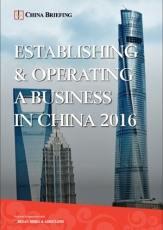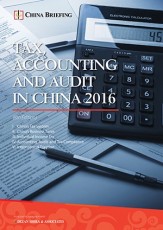China Regulatory Brief: Maternity Insurance Reform and VAT Invoice Verification
Maternity Insurance to be Combined with Basic Medical Insurance
On April 19, the Ministry of Human Resources & Social Security (MOHRSS) issued the “Notice on Reducing the Social Security Insurance Premium Rate in Stages.” The Notice stipulates that once relevant provisions are released and enacted, maternity insurance will be combined with basic medical insurance. In addition, starting May 1, the unemployment insurance premium rate may be reduced to one to 1.5 percent, and the individual payment rate will not exceed 0.5 percent. This reduction is planned to be made over a two-month period. Detailed schemes will be determined by each province or region individually.
28 Provinces Release Household Registration Reform Scheme
The Director of the National Development & Reform Commission (NDRC) Planning Department stated that 28 provinces and regions across China have announced their plans to reform the country’s long-standing household registration system. The NDRC also announced that a new “residence permit system” will be implemented comprehensively. The Chinese government will take further measures to reduce discrimination between local and non-locals when administering permanent household registration. However, it has been added that it is up to the migrant/rural worker’s discretion whether or not to apply for permanent household registration.
![]() RELATED: Business Advisory Services from Dezan Shira & Associates
RELATED: Business Advisory Services from Dezan Shira & Associates
Nationwide Suspension of the Registration of Enterprises Engaged in Financial Industry
China’s crackdown on the finance sector has been initiated, with policing and supervision of investment, financial, consulting, and asset management firms underway. Applicants looking to establish enterprises with finance related vocabulary in either their name or scope of operation will not be able to register at local branches of the State Administration for Industry and Commerce (AIC). Terminology such as exchange, finance, asset management, wealth management, fund, investment, private equity, online loan and borrowing, P2P, equity crowdfunding, internet finance and payment, etc. are to be targeted and suspended. This measure has been taken since a number of cases of illegal seizure of deposits and fraud by P2P operators and asset management firms emerged late last year.
B-Class Taxpayers Exempt from VAT Invoice Verification
Along with the country’s value-added tax (VAT) reform, China’s tax bureau recently released the “Announcement [2016] No.23” to build a more favorable tax environment for VAT taxpayers. The Announcement stipulates that companies which have been recognized by the tax bureau as “B-Class” taxpayers will be exempt from verification when they use VAT invoices issued by the sellers to offset their VAT liability. Furthermore, VAT taxpayers that are newly covered by the May 1 VAT reform will be exempt from VAT invoice verification during a grace period of three months from May to July. Instead, they may use the online VAT invoice management system for tax reduction purposes. Previously, only companies classified as an “A-Class” taxpayer by the tax-paying credit grade are exempt from invoice verification.
|
Asia Briefing Ltd. is a subsidiary of Dezan Shira & Associates. Dezan Shira is a specialist foreign direct investment practice, providing corporate establishment, business advisory, tax advisory and compliance, accounting, payroll, due diligence and financial review services to multinationals investing in China, Hong Kong, India, Vietnam, Singapore and the rest of ASEAN. For further information, please email china@dezshira.com or visit www.dezshira.com. Stay up to date with the latest business and investment trends in Asia by subscribing to our complimentary update service featuring news, commentary and regulatory insight. |

 Establishing & Operating a Business in China 2016
Establishing & Operating a Business in China 2016
Establishing & Operating a Business in China 2016, produced in collaboration with the experts at Dezan Shira & Associates, explores the establishment procedures and related considerations of the Representative Office (RO), and two types of Limited Liability Companies: the Wholly Foreign-owned Enterprise (WFOE) and the Sino-foreign Joint Venture (JV). The guide also includes issues specific to Hong Kong and Singapore holding companies, and details how foreign investors can close a foreign-invested enterprise smoothly in China.
 Tax, Accounting, and Audit in China 2016
Tax, Accounting, and Audit in China 2016
This edition of Tax, Accounting, and Audit in China, updated for 2016, offers a comprehensive overview of the major taxes that foreign investors are likely to encounter when establishing or operating a business in China, as well as other tax-relevant obligations. This concise, detailed, yet pragmatic guide is ideal for CFOs, compliance officers and heads of accounting who must navigate the complex tax and accounting landscape in China in order to effectively manage and strategically plan their China-based operations.
 Annual Audit and Compliance in China 2016
Annual Audit and Compliance in China 2016
In this issue of China Briefing, we provide a comprehensive analysis of the various annual compliance procedures that foreign invested enterprises in China will have to follow, including wholly-foreign owned enterprises, joint ventures, foreign-invested commercial enterprises, and representative offices. We include a step-by-step guide to these procedures, list out the annual compliance timeline, detail the latest changes to China’s standards, and finally explain why China’s audit should be started as early as possible.
- Previous Article Praktische Hilfestellung bei der CCC Zertifizierung und für das After Sales Geschäft – Teil 3
- Next Article Steuerpraxis: Antrag auf Steuervorteile nach internationalen Steuerabkommen










